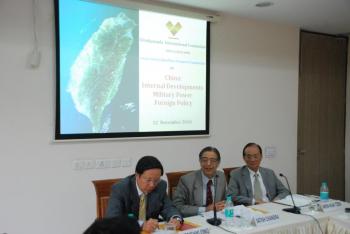Change Language
Interaction with Cross-Strait Interflow Prospect Foundation of Taiwan

 VIF held an interaction on 12 November 2010 with a multi-disciplinary team of researchers from Taiwan led by Mr. Wen Hua Tzen and accompanied by Taiwan’s Representative in India Mr. Wenchyi Ong. Ambassador Satish Chandra, former Deputy National Security Advisor welcomed the delegation. Ambassador Chandra thanked Mr. Ong in particular, for having brought such a high level delegation, consisting of scholars from varied backgrounds. He also thanked Mr. Ong for having facilitated one of VIF researchers, Mr. Anirban Ganguly’s visit to Taiwan.
The purpose of the delegates’ visit to VIF was to exchange knowledge and views about internal developments in China, by sharing insights into issues like change of leadership, use of armed forces, and its recent assertiveness in the South China Sea. As China had recently finished fifth plenary of the 17th Communist Party of China’s Central Committee meeting, the visit of delegation to the Foundation was very timely.
Mr. Wen Hua Tzen began his address on a very positive note saying that the meeting was the beginning of a very fruitful relationship between the two institutions. He introduced delegates to the audience and spoke about China’s internal developments, military power and foreign policy. He also talked about cross strait relations, regional security, and international relations in general.
Speaking about the ROC's Cross-Strait Policy, Mr. Tzen said that since KMT took office in 2008 under President Ma Ying-Jeou, there has been a shift in relations between PRC and ROC. Taiwan’s policy has been to seek a "win-win" situation with China without sacrificing its national interests. The present ROC government is following the three Nos policy of “no unification, no use of force, and no declaration of independence”. He further added that, as Taiwan is geopolitically close to the mainland, it cannot afford to promote an atmosphere of confrontation. But that does not mean that Taiwan shall sacrifice its independence, its democratic way of life, and status quo.
Discussions were held on China-Taiwan trade relations; Taiwan’s security dilemma; and the changing nature of China’s foreign policy and its geo-political ambitions. Besides, PRC’s efforts to improve the capabilities of its armed forces and the predicament of ASEAN countries vis-à-vis China and the US were also discussed.
VIF held an interaction on 12 November 2010 with a multi-disciplinary team of researchers from Taiwan led by Mr. Wen Hua Tzen and accompanied by Taiwan’s Representative in India Mr. Wenchyi Ong. Ambassador Satish Chandra, former Deputy National Security Advisor welcomed the delegation. Ambassador Chandra thanked Mr. Ong in particular, for having brought such a high level delegation, consisting of scholars from varied backgrounds. He also thanked Mr. Ong for having facilitated one of VIF researchers, Mr. Anirban Ganguly’s visit to Taiwan.
The purpose of the delegates’ visit to VIF was to exchange knowledge and views about internal developments in China, by sharing insights into issues like change of leadership, use of armed forces, and its recent assertiveness in the South China Sea. As China had recently finished fifth plenary of the 17th Communist Party of China’s Central Committee meeting, the visit of delegation to the Foundation was very timely.
Mr. Wen Hua Tzen began his address on a very positive note saying that the meeting was the beginning of a very fruitful relationship between the two institutions. He introduced delegates to the audience and spoke about China’s internal developments, military power and foreign policy. He also talked about cross strait relations, regional security, and international relations in general.
Speaking about the ROC's Cross-Strait Policy, Mr. Tzen said that since KMT took office in 2008 under President Ma Ying-Jeou, there has been a shift in relations between PRC and ROC. Taiwan’s policy has been to seek a "win-win" situation with China without sacrificing its national interests. The present ROC government is following the three Nos policy of “no unification, no use of force, and no declaration of independence”. He further added that, as Taiwan is geopolitically close to the mainland, it cannot afford to promote an atmosphere of confrontation. But that does not mean that Taiwan shall sacrifice its independence, its democratic way of life, and status quo.
Discussions were held on China-Taiwan trade relations; Taiwan’s security dilemma; and the changing nature of China’s foreign policy and its geo-political ambitions. Besides, PRC’s efforts to improve the capabilities of its armed forces and the predicament of ASEAN countries vis-à-vis China and the US were also discussed.
Event Date
November 12, 2010
Contact Us





